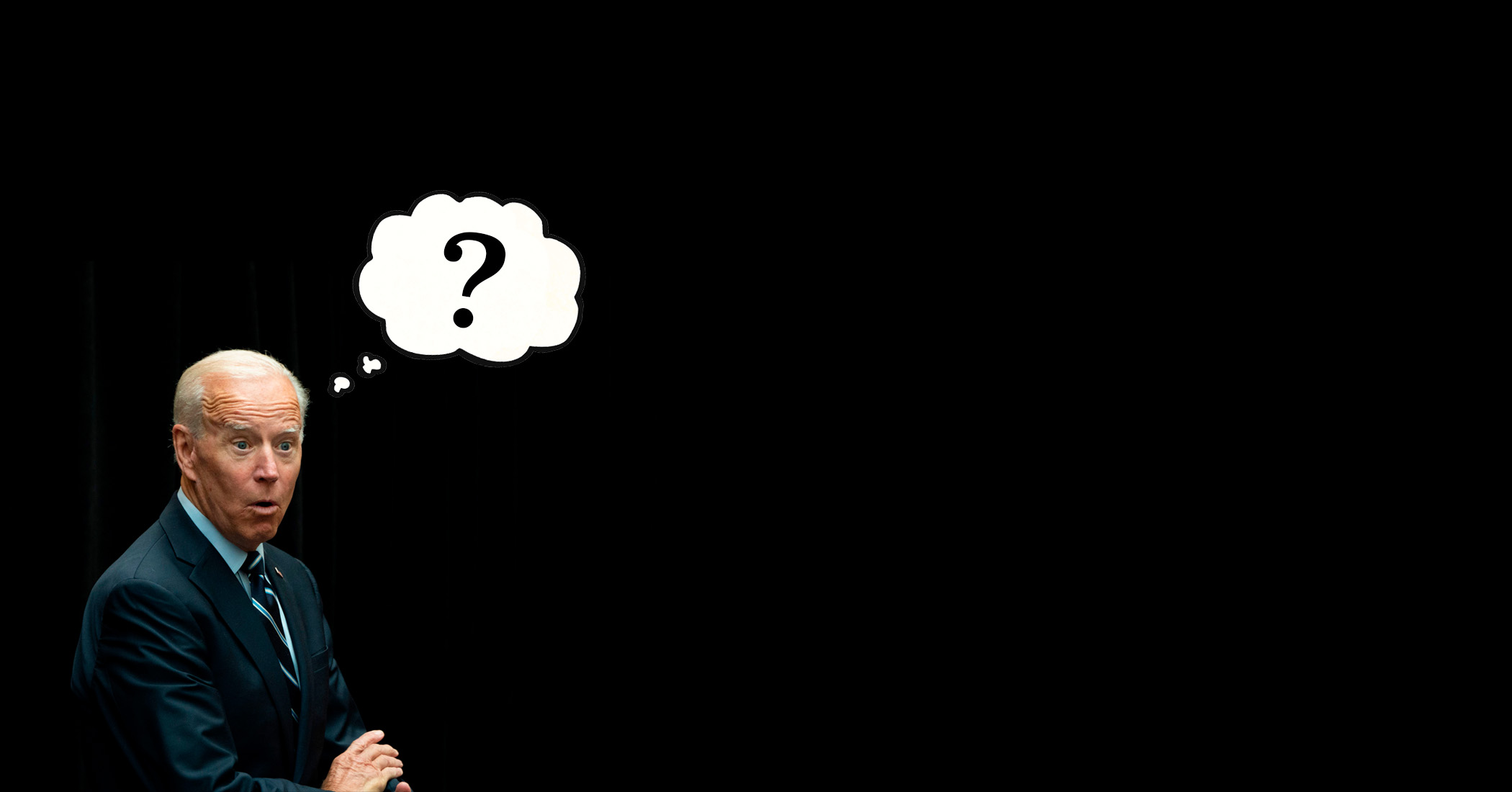Why Biden is impervious to gaffes
Eloquence might be overrated in politics


A free daily email with the biggest news stories of the day – and the best features from TheWeek.com
You are now subscribed
Your newsletter sign-up was successful
Call them gaffes, verbal flubs, or early signs of dodderdom — whatever name you use, Democratic frontrunner Joe Biden makes a lot of them.
An awful lot.
To some extent, he always has. Biden has long been known for putting his proverbial foot in his mouth — before he served as Barack Obama's vice president, while he served by Obama's side, and certainly since, now that he's drifting into his late 70s.
The Week
Escape your echo chamber. Get the facts behind the news, plus analysis from multiple perspectives.

Sign up for The Week's Free Newsletters
From our morning news briefing to a weekly Good News Newsletter, get the best of The Week delivered directly to your inbox.
From our morning news briefing to a weekly Good News Newsletter, get the best of The Week delivered directly to your inbox.
The question is whether it will hamper his presidential aspirations. Conventional wisdom holds that it will — as soon as large numbers of voters begin paying attention. I've certainly assumed that it would. There'll be Biden on a debate stage, stumbling over his words, contradicting himself, blurting out off-color or off-putting remarks that make him sound vaguely confused or out of touch — and then one of the other candidates will form lengthy, complex sentences communicating intricate, complicated thoughts about policy or American history or the many failings of Donald Trump. The contrast will be clear, striking, and more than enough to convince Biden's supporters to quietly abandon their candidate in favor the more articulate competition.
But what if this is wrong? What if Biden proves impervious to gaffes?
Of course an over-educated word-jockey like me — an opinion columnist — would be inclined to think Biden's verbal clumsiness would do him in. So would other "symbolic analysts." The term, invented and deployed by sociologists in the 1960s and '70, was used to describe the coming of post-industrial society and the jobs elites in such a society would do: They would generate, manipulate, analyze, and comment on various forms of information (verbal and mathematical symbols). That's one way to describe the work of journalists, professors, lawyers, judges, bankers, financiers, and corporate bureaucrats and consultants.
All of those people care about clarity and cogency. They care about evidence of analytical intelligence. They care about lucidity. And since they're well educated — sporting bachelor's degrees and often advanced professional degrees as well — they like, appreciate, and respect rhetorical eloquence.
A free daily email with the biggest news stories of the day – and the best features from TheWeek.com
But what about the rest of America — people who don't have bachelor's degrees and maybe not any college degree at all, who aren't symbolic analysts, who do service work, or who work in manufacturing, construction and other skilled trades, health care, or agriculture?
I suspect many of those people won't much care that Biden sometimes sounds a little confused, trips over his words, and embarrasses himself a little. I suspect many of them might actually like it — because it makes him sound a lot more like them than the other, more polished candidates do.
People talk about the role of identity in politics all the time, but they usually default to categories of identity wrapped up with the groups that make up the electoral coalitions of the two parties. For the Democrats, this means women, blacks, urban whites, Latinos, members of the LGBT community. For Republicans, it means white men, conservative evangelicals, and rural voters.
But people can identify with other traits in politicians, too — including the way they speak and think.
This first struck me in 2016 as I wondered at Trump's astonishing vulgarity and flamboyant ignorance of the issues. Here was a man who boasted about his manhood in a nationally televised debate. Who spoke in disjointed word salads. Who spewed acid and venom at everyone in sight — at his opponents right there on the debate stage with him no less than at the leadership of both parties, the media, and political, economic, and military elites in general. He sounded nothing like any major-party politician I'd ever heard. I was appalled and disgusted. But a significant segment of the Republican Party ate it up — partly on substance, I'm sure, but probably also because the style.
Trump talked and thought like they did.
Democrats are different. They almost uniformly despise Trump. And more than any of the 20-odd Democratic candidates running this year, Biden has placed revulsion at the president at the center of his message.
But that doesn't mean most Democrats identify with politicians who delight in spinning highly articulate disquisitions — and in Bernie Sanders' case, passionately angry rants — about public policy. They may prefer a guy who means well, sounds nice, appears to empathize with their struggles, shares their distaste for the president, and tries to talk about what he wants to accomplish with a slightly sloppy earnestness that sometimes veers into incoherence.
In this one respect at least, Biden may well be the Democrats' best possible answer to Trump. He's a different kind of average guy than the president, but an average guy all the same — one who doesn't try to sound like he's the smartest guy or gal in the room, and who might use words like "guy" and "gal" without feeling the least bit self-conscious.
This isn't the kind of candidate who especially appeals to me. I loved that Obama was smart as hell and conveyed complicated thoughts, especially after eight years of George W. Bush's malapropisms and twangy talk about following his "gut." This cycle I'm most viscerally drawn to Pete Buttigieg's nuanced and highly literate reflections on America and its multitude of problems.
But most Democrats aren't opinion journalists. And in a still-astonishingly-crowded field, Biden continues to maintain a sizable lead in just about every poll. A plurality of Democrats seem to like him. And perhaps they do so not despite his near-constant gaffes, but because of them.
Now, if the press and Biden's opponents continue to harp on his verbal flubs and begin to use them as a way of planting doubts about his advanced age, maybe this will change. But for the moment, there's no sign of this happening at all. Biden is riding high, and he doesn't have to worry that he's going to be brought low by his next gaffe.
Or the ones after that.
Damon Linker is a senior correspondent at TheWeek.com. He is also a former contributing editor at The New Republic and the author of The Theocons and The Religious Test.
-
 Local elections 2026: where are they and who is expected to win?
Local elections 2026: where are they and who is expected to win?The Explainer Labour is braced for heavy losses and U-turn on postponing some council elections hasn’t helped the party’s prospects
-
 6 of the world’s most accessible destinations
6 of the world’s most accessible destinationsThe Week Recommends Experience all of Berlin, Singapore and Sydney
-
 How the FCC’s ‘equal time’ rule works
How the FCC’s ‘equal time’ rule worksIn the Spotlight The law is at the heart of the Colbert-CBS conflict
-
 The ‘mad king’: has Trump finally lost it?
The ‘mad king’: has Trump finally lost it?Talking Point Rambling speeches, wind turbine obsession, and an ‘unhinged’ letter to Norway’s prime minister have caused concern whether the rest of his term is ‘sustainable’
-
 The billionaires’ wealth tax: a catastrophe for California?
The billionaires’ wealth tax: a catastrophe for California?Talking Point Peter Thiel and Larry Page preparing to change state residency
-
 Bari Weiss’ ‘60 Minutes’ scandal is about more than one report
Bari Weiss’ ‘60 Minutes’ scandal is about more than one reportIN THE SPOTLIGHT By blocking an approved segment on a controversial prison holding US deportees in El Salvador, the editor-in-chief of CBS News has become the main story
-
 Memo signals Trump review of 233k refugees
Memo signals Trump review of 233k refugeesSpeed Read The memo also ordered all green card applications for the refugees to be halted
-
 Has Zohran Mamdani shown the Democrats how to win again?
Has Zohran Mamdani shown the Democrats how to win again?Today’s Big Question New York City mayoral election touted as victory for left-wing populists but moderate centrist wins elsewhere present more complex path for Democratic Party
-
 Millions turn out for anti-Trump ‘No Kings’ rallies
Millions turn out for anti-Trump ‘No Kings’ ralliesSpeed Read An estimated 7 million people participated, 2 million more than at the first ‘No Kings’ protest in June
-
 Democrats: Harris and Biden’s blame game
Democrats: Harris and Biden’s blame gameFeature Kamala Harris’ new memoir reveals frustrations over Biden’s reelection bid and her time as vice president
-
 ‘We must empower young athletes with the knowledge to stay safe’
‘We must empower young athletes with the knowledge to stay safe’Instant Opinion Opinion, comment and editorials of the day
